Collection of materials relating to neuro-ophthalmology as part of the Neuro-Ophthalmology Virtual Education Library.
NOVEL: https://novel.utah.edu/
TO
- NOVEL233
| Title | Creator | Description | Subject | ||
|---|---|---|---|---|---|
| 151 |
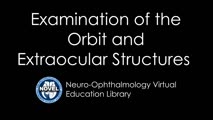 |
Examination of the Orbit and Extraocular Structures | Julie Falardeau, MD | Introduction to the Examination of Orbit and Extraocular Structures in the NExT curriculum. | Exams; Orbit; Extraocular |
| 152 |
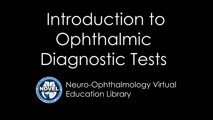 |
Introduction to Ophthalmic Diagnostic Tests | Valérie Biousse, MD | Introduction to the ophthalmic diagnostic testing section of the NExT curriculum. | Exams; Diagnostics |
| 153 |
 |
Other Special Situations | John Pula, MD | Introduction to examinations in special situations. | Exams |
| 154 |
 |
Introduction to the Slit Lamp and the Slit Lamp Examination | Chris Bair, MD and Tyler Quist, MD | This brief video from fourth-year medical students Chris Bair and Tyler Quist discusses the details of your ophthalmology rotation at the Moran Eye Center, as well as providing a primer on how to use the slit lamp and perform a basic eye exam. | Medical Student; Exam; Education |
| 155 |
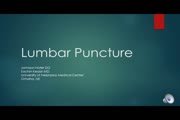 |
Lumbar Puncture | Jamison Hofer, DO; Sachin Kedar, MD | Explanation of lumbar puncture procedure. | Lumbar Puncture |
| 156 |
 |
Double Simultaneous Visual Field Stimulation | Victoria S. Pelak, MD; James R. Bateman, MD, MPH; Brianne Bettcher, PhD | Explanation of the double simultaneous visual field exam, as part of the larger higher order visual function examination. Video accompanies The Clinical Examination of Higher Order Visual Function: Syndrome-based Approach: https://collections.lib.utah.edu/ark:/87278/s6837zqp and Visual Neglect: http... | Visual Function; Visual Fields |
| 157 |
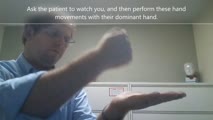 |
Executive Function | James R. Bateman, MD, MPH; Victoria S. Pelak, MD | Introduction to the executive function exam as part of the larger mental status examination. Video accompanies the The Mental Status Examination lecture at https://collections.lib.utah.edu/ark:/87278/s64b7716 and Cognitive Assessment at: https://collections.lib.utah.edu/ark:/87278/s6qc49rx | Mental Status |
| 158 |
 |
Ideomotor Apraxia | James R. Bateman, MD, MPH; Victoria S. Pelak, MD | Introduction to the ideomotor apraxia exam as part of the larger mental status examination. Video accompanies the The Mental Status Examination lecture at https://collections.lib.utah.edu/ark:/87278/s64b7716 and Cognitive Assessment at: https://collections.lib.utah.edu/ark:/87278/s6qc49rx | Mental Status |
| 159 |
 |
Limb-Kinetic Apraxia | James R. Bateman, MD, MPH; Victoria S. Pelak, MD | Introduction to the limb kinetic apraxia exam as part of the larger mental status examination. Video accompanies the The Mental Status Examination lecture at https://collections.lib.utah.edu/ark:/87278/s64b7716 and Cognitive Assessment at: https://collections.lib.utah.edu/ark:/87278/s6qc49rx | Mental Status |
| 160 |
 |
Eye Drop Instillation: Technique & Indications | Karl C. Golnik, MD | Description and demonstration of eye drop instillation. | Eye Drops |
| 161 |
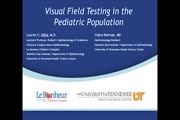 |
Visual Field Testing in the Pediatric Population | Lauren C. Ditta, MD | Visual field testing can be performed in the pediatric population with ease, however the proper technique for testing must be utilized and is tailored to each child's unique clinical situation and age. Confrontation visual field testing is a quick and easy; test that can yield a rough assessment of ... | Visual Field Testing; Pediatric; Confrontation Visual Field; Automated; Perimetry |
| 162 |
 |
Introduction to the Evaluation of Visual Function | Sean Gratton, MD | An introduction to evaluating a patient's visual function. | Visual Function |
| 163 |
 |
Distance Visual Acuity Testing | Sean Gratton, MD | Demonstration of measuring distance visual accuity. | Visual Acuity Testing |
| 164 |
 |
Red Color Desaturation | Sean Gratton, MD | Exploring red color desaturation. | Red Color Desaturation |
| 165 |
 |
Refraction | Sean Gratton, MD | An introduction to refraction. | Refraction |
| 166 |
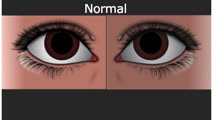 |
Normal Light Reflex and Relative Afferent Pupillary Defect (RAPD) | Marshall Huang, 4th Year Medical Student | A Relative Afferent Pupillary Defect is an examination finding in patients who have an asymmetric pupillary reaction to light when it is shined back and forth between the two eyes. It is most commonly a sign of asymmetric optic nerve disease or damage but can also present in widespread asymmetric r... | Light Reflex; RAPD |
| 167 |
 |
Examination of Lymph Nodes | John D. Ng, MD, MS, FACS | Demonstration of lymph node examination. | Exam; Lymph Nodes |
| 168 |
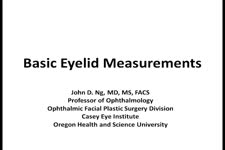 |
Basic Eyelid Measurements | John D. Ng, MD, MS, FACS | Demonstration of basic eyelid measurements. | Eyelid |
| 169 |
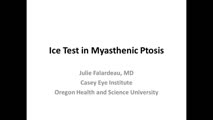 |
Ice Test in Myasthenic Ptosis | Julie Falardeau, MD | Demonstration of ice test. | Ice Test; Myasthenic Ptosis |
| 170 |
 |
Introduction to Neurological Imaging | Devin Mackay, MD | Introduction to the techniques of neurological imaging examination. | Neurological Imaging |
| 171 |
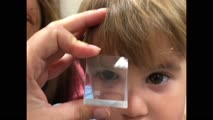 |
Pediatric Visual Acuity Strategies: Induced Tropia Test | Anat Bachar Zipori, MD; Nasrin Najm-Tehrani, FRCS Ed (Ophth), FRCSC | Induced Tropia Test. Using a 10-20 base-down prism, this exam demonstrates equal vision in both eyes. If there is evidence of ocular misalignment, prisms can be used to neutralize the movement and thereby measure the deviation, whether it is a heterotropia or heterophoria. Prisms are placed in front... | Induced Tropia; Prism Test |
| 172 |
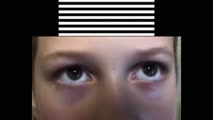 |
Vertical optokinetic nystagmus | Anat Bachar Zipori, MD; Nasrin Najm-Tehrani, FRCS Ed (Ophth), FRCSC | Visual depiction of the vertical OKN drum test. The vertical optokinetic drum test is an exam used to elicit vertical optokinetic nystagmus (OKN) when there is horizontal nystagmus. The hand-held "optokinetic" drums or tapes that are used to elicit smooth movements primarily test the pursuit system.... | Vertical Optokinetic Nystagmus; OKN Drum Test |
| 173 |
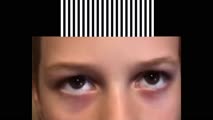 |
Horizontal Right Optokinetic Nystagmus | Anat Bachar Zipori, MD; Nasrin Najm-Tehrani, FRCS Ed (Ophth), FRCSC | Visual depiction of the horizontal OKN drum test. The hand-held "optokinetic" drums or tapes that are used to elicit smooth movements primarily test the pursuit system. This video supplements Paediatric Neuro-ophthalmology: Visual Acuity Assessment Strategies: https://collections.lib.utah.edu/ark:/... | Horizontal Right Optokinetic Nystagmus; OKN Drum Test |
| 174 |
 |
Introduction to Examination of the Pediatric Patient | Jason H. Peragallo, MD | Introduction to examination of the pediatric patient. | Pediatric Patient |
| 175 |
 |
Nerve Conduction Studies and Electromyography Basics | Jamison Hofer, DO; Kiel Woodward, MD; Ezequiel Piccione, MD; Sachin Kedar, MBBS, MD | Presentation covering an overview of the basics of nerve conduction studies and electromyography. Includes coverage of common indications, limitations and contraindications. There is an explanation for how to order the test, and how to understand the results. | Nerve Conduction Studies; Electromyography; NCS; EMG |
